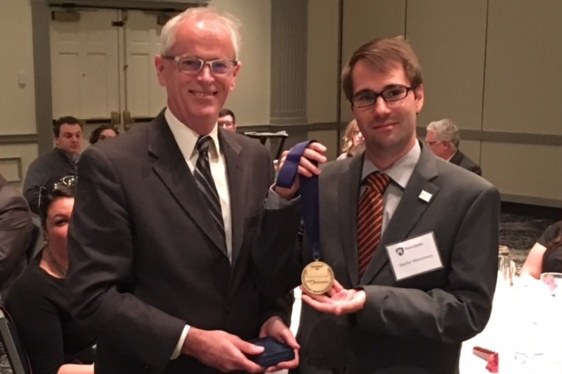Posted: April 18, 2017
Ph.D. candidate Bastian Minkenberg was selected for Penn State's Alumni Association Dissertation Award of $5,000.
Bastian Minkenberg's selection for a $5,000 Alumni Association Dissertation Award and his achievements were recognized at the Graduate School's Student Awards Luncheon at the Nittany Lion Inn on April 18. He was also recognized at the Graduate School Alumni Society's Spring Social and Recognition Dinner on March 25 at the Nittany Lion Inn.
Bastian's dissertation research uses a new genome-editing technology called CRISPR/Cas9 to study the function of rice genes important for signal transduction of environmental stresses and developmental clues. He used a novel method developed in the lab of his dissertation adviser Dr. Yinong Yang to simultaneously generate mutations in several of these genes and discovered novel functions of two of them in the formation of reproductive organs. In addition, Bastian developed ways to improve prediction of unintentional editing events, so called off-targets. He will soon host a website at Penn State to share his results for seven plant genomes of important model and crop species.
The results of Minkenberg's dissertation research serve as a basis for using new genome-editing tools to accelerate discovery of genes responsible for agronomically beneficial traits, such as durable and broad spectrum disease resistance traits. These genes could then be introduced into rice and other crop plants to significantly increase their yield. As the current rate of crop yield increases are predicted to be insufficient in the near future to meet the needs of an ever-growing world population, the new technology Bastian used in his dissertation research promises to speed up plant breeding and trait discovery toward meeting the increasing global demand for food.


